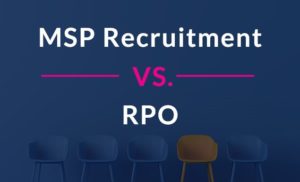Topics: MSP VMS Recruitment, VMS Recruiting, VMS Staffing Solutions
The Game-Changing Impact of VMS on Rapid Physician Staffing
Posted on March 26, 2024
Written By Ranjana Singh

The ability to swiftly respond to crisis situations is paramount in the healthcare staffing industry. The shortage of physician staffing during healthcare crises poses a significant challenge, necessitating innovative solutions to ensure timely patient care. One such game-changer is the implementation of Vendor Management Systems (VMS) in the healthcare industry. In this blog, we’ll explore the profound impact of VMS on rapid physician staffing during healthcare crises, shedding light on its benefits, challenges, and the transformative role it plays in ensuring a robust healthcare response.
Understanding Vendor Management Systems
Vendor Management Systems are sophisticated platforms designed to streamline the process of managing external talent and service providers. In the context of healthcare, VMS plays a pivotal role in connecting healthcare facilities with a pool of qualified physicians, enabling swift and efficient staffing solutions, especially during crises.
Benefits of VMS in Healthcare Crisis Staffing
1. Rapid Access to Talent: VMS facilitates instant access to a diverse pool of qualified physicians, allowing healthcare facilities to quickly identify and onboard medical professionals based on specific skill sets required during a crisis. This swift response is crucial in ensuring that healthcare services remain uninterrupted.
2. Efficient Credentialing Process: Credentialing is a critical aspect of physician staffing, but it can be a time-consuming process. VMS automates and streamlines credentialing, ensuring that physicians are qualified and compliant with industry standards, expediting the onboarding process during critical times.
3. Cost-Effective Solutions: Healthcare crises often strain budgets, and VMS offers a cost-effective solution by optimizing the staffing process. Facilities can select physicians based on their specific needs, avoiding unnecessary expenditures and ensuring efficient resource allocation.
4. Data-Driven Decision Making: VMS provides valuable insights through analytics and reporting features, allowing healthcare administrators to make informed decisions. This data-driven approach enables facilities to adapt their staffing strategies dynamically based on real-time information during crisis situations.
Challenges and Solutions of Vendor Management Systems
1. Integration Challenges: While implementing VMS may pose integration challenges initially, the long-term benefits far outweigh the initial hurdles. Collaborative efforts between healthcare facilities and VMS providers are crucial to overcoming integration challenges and optimizing the system for efficient crisis response.
2. Ensuring Quality of Care: One potential concern is the need to ensure that physicians brought in through VMS maintain the highest standards of patient care. Implementing rigorous vetting processes and maintaining open communication channels between facilities and physicians can address this concern.
Conclusion
In the face of healthcare crises, rapid physician staffing is not just a necessity but a lifeline for communities in need. Vendor Management Systems emerge as a beacon of hope, providing a streamlined, efficient, and cost-effective solution to healthcare facilities grappling with staffing shortages. By embracing the transformative power of VMS, the healthcare industry can bolster its response capabilities, ensuring that patients receive the care they need when they need it most. As technology continues to advance, the collaboration between healthcare facilities and VMS providers promises to be a cornerstone in building a resilient and responsive healthcare system for the future.
Frequently Asked Questions
How important is vendor management?
Vendor management is crucial for cost control, risk mitigation, and operational efficiency. It ensures favorable terms, identifies and mitigates risks, streamlines processes, and fosters strong vendor relationships, ultimately enhancing customer satisfaction.
What is the role of vendor management?
Vendor management involves sourcing, contract negotiation, performance monitoring, relationship building, and risk management. It selects suitable vendors, negotiates contracts, monitors performance, fosters collaboration, and mitigates risks associated with vendors.
What is the impact of vendor management?
Effective vendor management leads to cost savings, operational efficiency, risk mitigation, quality improvement, and competitive advantage. It optimizes costs, streamlines operations, minimizes risks, enhances product quality, and provides a competitive edge in the market.
Originally published Mar 26, 2024 03:03:39, updated Jan 17 2025
Topics: MSP VMS Recruitment, VMS Recruiting, VMS Staffing Solutions







